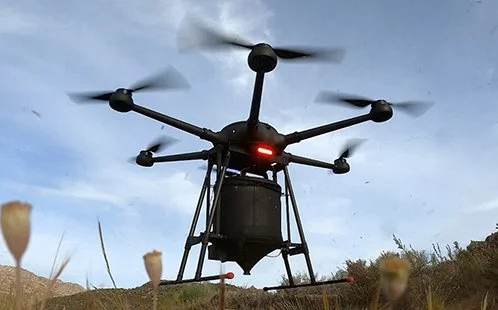Drone seeding to revolutionise ecological restoration
AirSeed Technologies is working with Western Sydney University and the Australian Institute of Botanical Science on a half a million-dollar research project which involves native seed pods being spread across targeted Garden sites using drones.
Drones are widely used for forestry purposes but this project is investigating their use to establish a wide diversity of local Cumberland Plain native plants, which the Western Sydney garden is home to.
More than 52 million hectares of Australia is now considered degraded land.
The Garden’s Curator Manager Michael Elgey said the affected land at Mount Annan was previously a dense forest of the invasive weed African olive.
Image: AirSeed Technologies, courtesy of Western Sydney University.
“After decades of olive invasion there were very few native species remaining,” he said.
“This project is a fantastic opportunity to re-establish the original native Cumberland Plain vegetation and create habitat on these ‘ground zero’ cleared olive sites.
“Seeds have been specially collected from our existing conservation areas at the Garden and we hope to establish Cumberland Plain Woodland and Western Sydney Dry Rainforest communities which are now critically endangered.”
Lead researcher Associate Professor Rachael Gallagher, from Western Sydney University's Hawkesbury Institute for the Environment, said due to the state of Australia’s degraded land, we urgently needed scalable solutions which would allow us to restore diverse native vegetation.
“We can’t meet the significant goals of national and global restoration programs by sticking with the status quo,” Dr Gallagher said.
“We urgently need new techniques which reduce seed wastage and are capable of planting lots of species fast which will lead to benefits for both carbon sequestration and biodiversity”.
Project partner investigator at the Australian PlantBank, Dr Peter Cuneo, said this type of direct seeding had the potential to revolutionise native vegetation establishment and ecological restoration in Australia.
“The drones contain pre-formed seed pods which contain seed, nutrients and microbial inoculants that will support seedlings as they germinate from the pellet pods and establish when conditions are right,” Dr Cuneo said.
AirSeed spokesperson Andrew Walker, CEO and Co-Founder, said “the novel fusion between AirSeed’s biotech and drone technology is reshaping the economics of large-scale ecological restoration practices”.
Royal Botanic Gardens and Domain Trust Chief Executive Denise Ora said many people didn’t realise the important research being done at the Institute on everything from tiny seeds to giant trees.
“Whether they are out in the field collecting specimens or undertaking studies in our state-of-the-art laboratories, our scientists are working hard to ensure we find ways to protect and conserve valuable plant species for future generations,” she said.
* This article was originally published by Western Sydney University News here.

